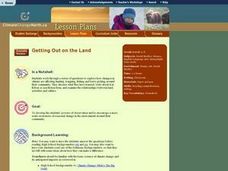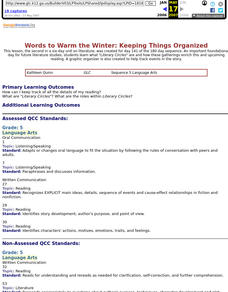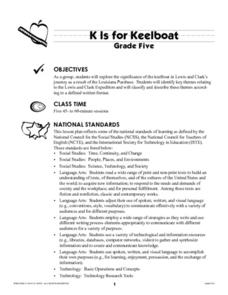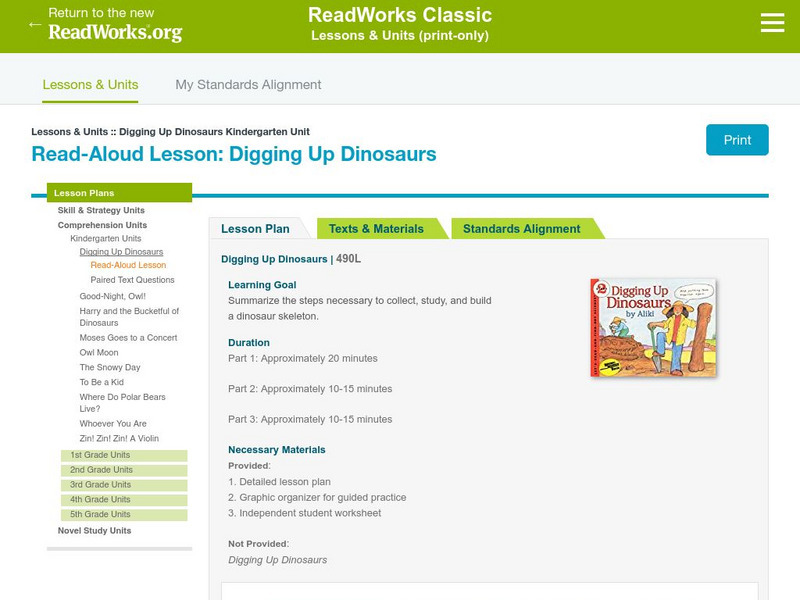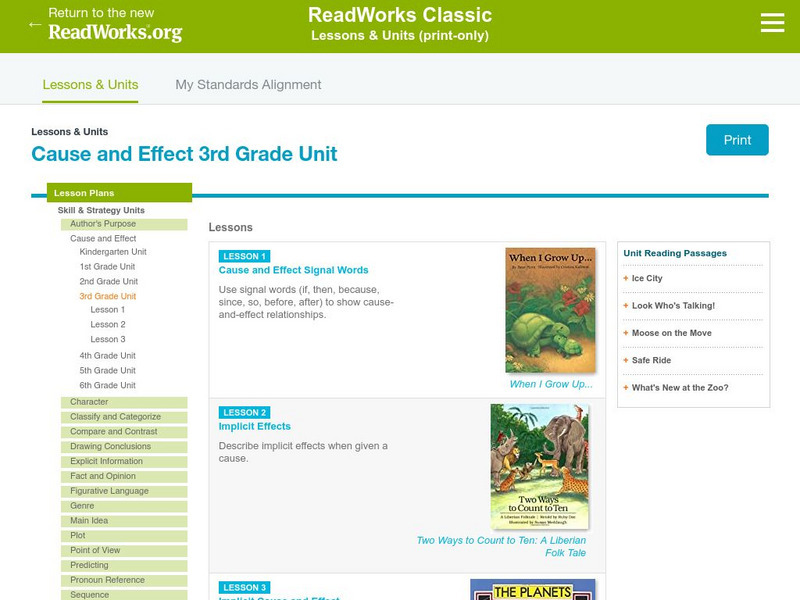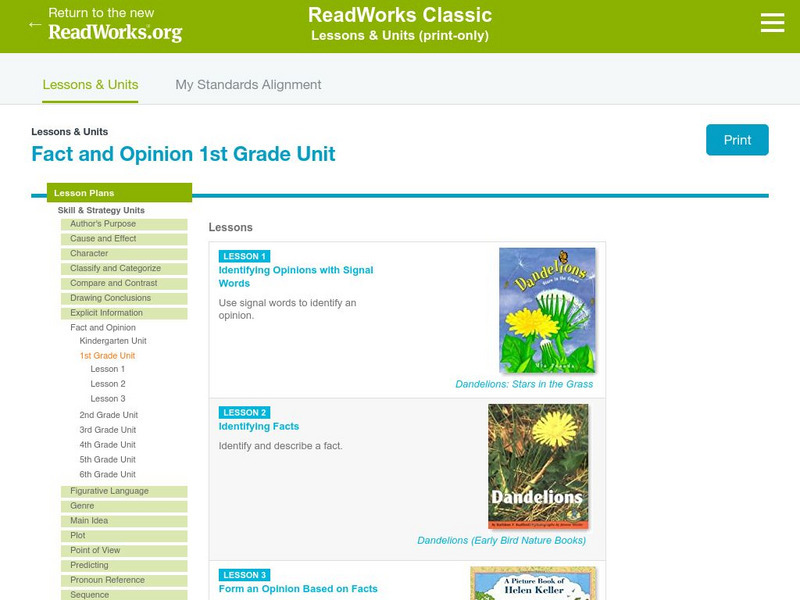Curated OER
Getting Out on the Land
Students explore seasonal change in the environment around their community. They investigate how changes in climate are affecting hunting, trapping, fishing and berry picking around their community. Students write about the...
Curated OER
Creating a Children's Book
Students create a studenT book following an introduction to the publication process. Through exposure to several sources, students learn the steps involved in publishing a book.
Curated OER
Storytelling
Pupils explore, as a basis for their poem, their own personal observations and understandings of a specific person's character which might include exploits, actions, mannerisms and personality. They write a brief poem that tells a story.
Curated OER
Roughing It in the Backwoods
Learners discuss the differences between living during the mid-19th century and today and then debate which would be better.
Curated OER
Farm Animals
First graders conduct research about farm animals and what it is like to live on a farm. They explore a variety of websites and complete an online WebQuest. They select a farm animal, and write a report about their animal's...
Curated OER
Celebrating Thanksgiving
First graders identify symbols associated with special days and give reasons for observing holidays. They compare families of long ago with todya and talk about the first Thanksgiving and how it is celebrated in modern times. For...
Curated OER
Which Came First?
Students examine the significance of the Louisiana Purchase and the journey of Lewis and Clark. They sequence events that occurred on the journey of Lewis and Clark.
Curated OER
Eloquent Speech
Second graders discover that oral and written communication can be improved, and made to sound more eloquent, when the following questions are addressed; Who? What? Where? When? Why? students use word processing to copy a poem using clip...
Curated OER
Using Scholastic News to Introduce the Net
Third graders log on to the net, type in the address for Scholastic and browse the subjects for the week. They select one area of interest and generate five interesting facts about the article.
Curated OER
Memories
Fifth graders collect artifacts of their fifth grade school year and make a technology based Memory Book.
Curated OER
Earth Day
Third graders utilize technology to access, analyze, interpret and communicate information about Earth Day.
Curated OER
Words to Warm the Winter: Keeping Things Organized
Fifth graders are in Literary Circles according to the book they've chosen and choose roles.
Curated OER
Language Arts: Survival Diaries
Students are able to compose a dialectical journal entry which analyzes information presented in a text. They are able to compose a creative journal entry which develops characters, presents events in logical order, and includes sensory...
Curated OER
Seeing Is Believing
Students research and describe the stories of Thomas Jefferson, Meriwether Lewis and William Clark. They analyze historical sources from different points of view and present an analysis of two historical contexts.
Curated OER
K Is for Keelboat
Fifth graders investigate the significance of the keelboat in the Lewis and Clark expedition. They define the key themes of the expedition and classify them in prescribed format, an ABC book.
South Carolina Educational Television
Know It All: Non Fiction Text Features
Fifth graders will use non-fiction books to identify and explain how text features help them as individual readers.
Better Lesson
Better Lesson: Analyzing Text Complexity of Non Fiction Sources
This lesson plan will help learners read and comprehend nonfiction, specifically biographies, through determining criteria for text complexity. Included is a PDF and Smart Notebook titled Determining Text Complexity, and an example of a...
ReadWriteThink
Read Write Think: Diagram It! Identifying, Comparing & Writing About Non Fiction
Introduce your young scholars to the different types of non-fiction such as biographies, biographies, and informative books. Students will use graphic organizers, peer interaction, and hands-on experiences to further understanding of...
Read Works
Read Works: Grade 2: Three Lesson Unit: Genre
[Free Registration/Login Required] A series of three lesson plans designed to teach young scholars to compare and contrast fiction and non-fiction, identify the characteristics of non-fiction, and use guide words to locate topics in an...
Read Works
Read Works: Read Aloud Lesson: Digging Up Dinosaurs
[Free Registration/Login Required] Teachers will read "Digging Up Dinosaurs" using the close reading technique. Students will use graphic organizers to summarize the steps necessary to collect, study, and build a dinosaur skeleton.
Read Works
Read Works: Explicit Information 3rd Grade Unit
[Free Registration/Login Required] A two-lesson unit in which students learn how to identify explicit information in non-fiction text by creating questions and then reading the text to find answers. Students also use explicit information...
Read Works
Read Works: Cause and Effect 3rd Grade Unit
[Free Registration/Login Required] A three-lesson unit on cause and effect. Learners learn to use signal words to identify cause and effect relationships and to describe possible effects when given a cause in fiction. Students also learn...
Read Works
Read Works: Fact and Opinion 1st Grade Unit
[Free Registration/Login Required] A three-lesson unit on fact and opinion through which students learn how to identify opinions through signal words, identify facts in a non-fiction text, and use facts to help them formulate opinions of...
Read Works
Read Works: Fourth Grade: Three Lesson Unit: Compare and Contrast
[Free Registration/Login Required] A three-instructional activity unit on comparing and contrasting through which students compare and contrast two non-fiction articles and two editorials, and write a compare and contrast essay. With...


